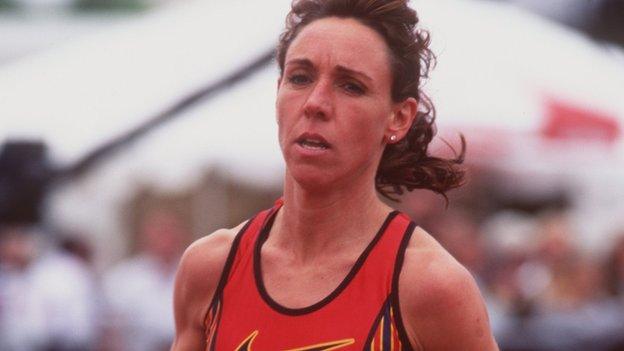Alberto Salazar's response: What questions remain?
- Published
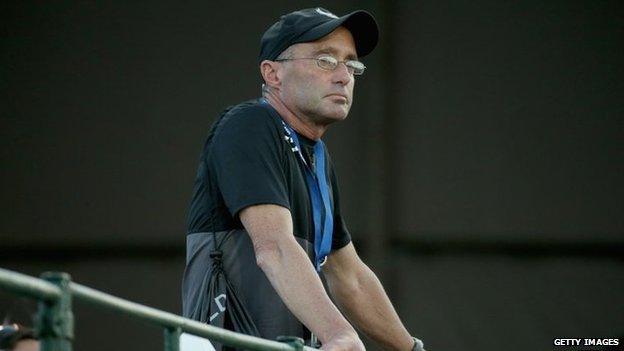
It was long awaited and when it came it pulled no punches.
Alberto Salazar's response, external to BBC Panorama and ProPublica allegations about anti-doping violations ran to nearly 12,000 words and was beefed up with dozens of emails and statements.
"I will never permit doping. Oregon Project athletes must fully comply with the Wada (World Anti-Doping Agency) code and IAAF (International Association of Athletics Federations) rules," said Salazar.
He said the journalism behind the programme was false and hurtful, while launching personal attacks on the story's principal contributors. He said they were "haters" and were "at best, misinformed. At worst, they are lying."
Salazar has demanded the BBC retracts its allegations.
The BBC says it stands by the journalism in the programme.
Within two hours of his open letter going online, it was reported that the US Anti-Doping Agency (USADA) had been investigating allegations that Salazar had skirted anti-doping rules. The reports suggested USADA had taken statements from more than 12 witnesses.
The BBC now understands that at least six former Oregon Project members have been contacted by USADA in the past month, and that an inquiry into Salazar is being led by chief USADA investigator Bill Bock.
USADA does not confirm investigations.
It is worth taking the responses to the allegations made about Salazar and his star athlete Galen Rupp in turn. It is also worth looking at what the statement did not address.

THE ALLEGATIONS:
Testosterone use by Galen Rupp
Galen Rupp says he is '100% behind' coach Alberto Salazar
Salazar's former assistant coach Steve Magness raised a number of concerns, and produced a document from a lab report that suggested Galen Rupp was on "testosterone medication" aged 16.
Four weeks ago, Salazar told the BBC the notation on the document had been a mistake, and that the legal nutritional supplement Testoboost had been incorrectly recorded as "testosterone medication".
Mauro DiPasquale, owner of Testoboost, told ProPublica this week Salazar had recently contacted him in the hope that he would confirm Rupp was taking Testoboost in 2002.
He said he had no records regarding Salazar and Testoboost prior to 2004, and had no way of knowing whether Rupp was taking it in 2002.
In his response on Wednesday, Salazar said Rupp "does not recall exactly which supplement he took in 2002. It could have been Testoboost, Alpha Male, Tribex, or ZMA."
The individual who made the notation in this detailed chart about Rupp's blood levels was Dr Loren Myhre, head physiologist at the Nike lab, for whom Salazar said he had the greatest respect.
Salazar said the notation "is an error that cannot be explained as Dr Myhre is no longer alive" and that Rupp "likely made some comment about taking something related to a testosterone supplement" to Dr Myhre.
No other mistakes were revealed in this extensive document.
No other explanation is offered as to why a leading scientist who was working intensively with elite athletes would make such a basic and potentially damaging error in his notes.

Dr Myhre advised an athlete to get testosterone
This wasn't the only time Dr Myhre was referred to in the BBC and ProPublica output.
"Mike", a runner associated with the Oregon Project whose identity has been protected, told the BBC and ProPublica that in 2007 Dr Myhre advised him to see a specialist to get put on testosterone medication to get his levels "back to normal" because "this is what Alberto does".
Salazar dismissed this claim as "completely false. It is not what I did then; it's not what I do now and it's not what I have ever done."

Salazar's experiment
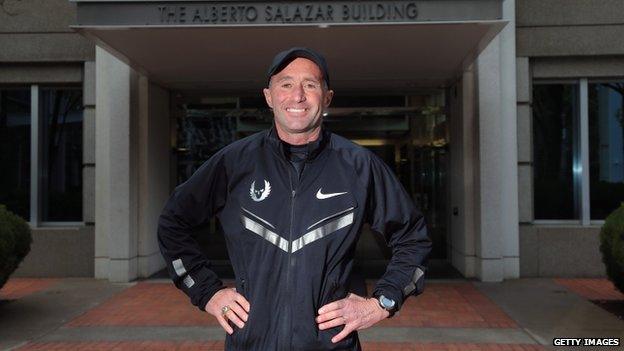
Allegations had been made by Magness that Salazar had carried out experiments on his own adult son, Alex, to see how much testosterone gel would have to be rubbed on before it triggered a positive test.
The BBC and ProPublica reported that the reason given by Salazar for this at the time was that he was guarding against his athletes being sabotaged by their enemies, though Magness dismissed this explanation as "ludicrous" and said it "was them trying to figure out how to cheat the tests".
Salazar did not respond to this allegation when it was put to him seven weeks ago. Nor did his son.
But in his response on Wednesday, Salazar confirmed the experiments with the banned steroid took place on both of his sons.
He provided detailed email correspondence with endocrinologist Dr Jeffrey Brown, who Salazar said "set up the experiment".
Salazar said his concerns were prompted by twice-banned sprinter Justin Gatlin's 2006 claim that his positive test for testosterone was caused by being sabotaged by a masseur.
"If it was possible, we wanted to make sure our post-race protocol was structured to eliminate this risk," Salazar said.
"I was a bit naive and let my paranoia get the best of me here but there was never intent to do anything illegal."
Following the experiment, Salazar told Dr Brown in an email: "I'll sleep better now after drug tests at big meets knowing someone didn't sabotage us!"
Testosterone is a controlled substance in the US and it is illegal to use it without a prescription.
ProPublica have asked Dr Brown about his participation in the experiment and he appeared to contradict Salazar's claims that it was "set up" by him.
He said he did not prescribe a controlled substance for Salazar's sons or other research subjects as part of an experiment.
"No, absolutely not," Brown said. "I didn't do that, and would not do that. I would never do that."
He said he was merely advising Salazar on how to conduct research on potential sabotage "in a hypothetical situation".
There were no emails provided to show that Salazar had alerted USADA to his testosterone experiment.
Both of Salazar's sons work with the Oregon Project.
Wada rule 2.6.2, external stipulates that possession by an "athlete support person" of any prohibited substance or prohibited method is banned without a Therapeutic Use Exemption (TUE) or other acceptable justification.

More claims of banned drugs around the camp
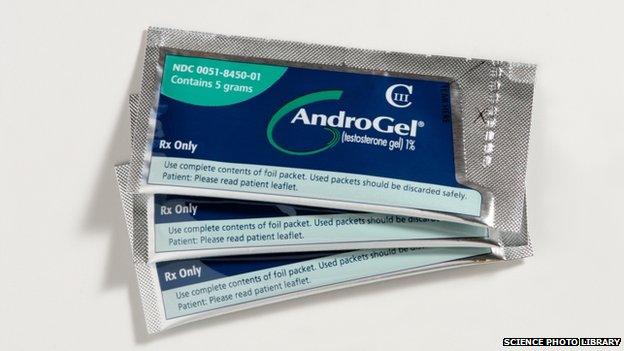
BBC Panorama and ProPublica published claims that testosterone gel was often carried by Salazar, and was seen by athletes and support staff around training venues.
Two masseurs, John Stiner and Al Kupscak, claimed Salazar had told them it was for his heart.
Salazar had suffered a serious cardiac arrest in 2007 and several cardiologists told the BBC and ProPublica that testosterone would rarely be prescribed for someone who had heart problems.
Salazar had no comment to make on this when the allegation was first made to him a month before transmission.
He denied telling anyone the gel was for his heart and produced a letter from Dr Kristina Harp, dated June 2015, who said he had been prescribed testosterone for hypogonadism (low testosterone) since 2005.
He provided an additional letter from a cardiologist who said the "benefits of preserving his energy level… outweighed the small risk of continued Androgel use".

Claims of unethical behaviour

Kara and Adam Goucher are both former Oregon Project athletes
Former Oregon Project star athlete Kara Goucher alleged that Salazar recommended she take the thyroid medication Cytomel that had not been prescribed for her - she was already prescribed a different thyroid hormone - in order to lose weight.
Goucher showed the BBC a pill bottle with the pharmaceutical label ripped off and the word "Cytomel" handwritten on it - written by Salazar, she said.
In his response, Salazar denied he was unhappy about her weight, and said he'd never given Goucher Cytomel to lose weight.
He said he did once give Goucher Cytomel, but had done so on the instructions of Goucher's doctor, Dr Brown, in August 2011.
For support, Salazar referred to an email from Dr Brown recommending that Salazar should give Cytomel to Goucher at the World Championships in Daegu, South Korea, in August 2011, following a cortisone injection for an injury.
In response, Goucher and her husband Adam - also a former Oregon Project athlete - say their allegation refers to a completely separate incident, in March 2011 ahead of the Boston Marathon. This was six months after the birth of her child, and five months before Daegu.
Goucher said Salazar was conflating two different incidents, adding: "His story is a different timeline. He's trying to use Daegu to cover up Boston."

Use of medical exemptions
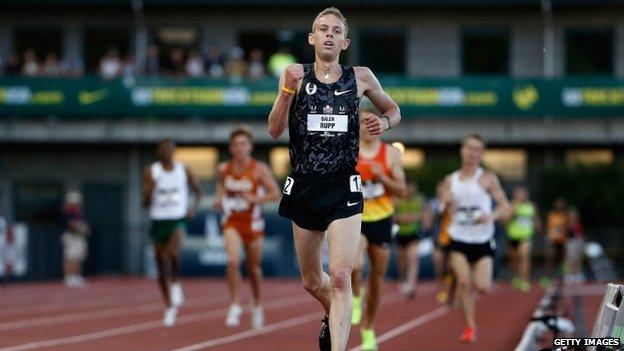
The Gouchers said Salazar told them he "coached" Galen Rupp on the symptoms of dehydration
Allegations were made by the Gouchers that Salazar and Rupp had flouted anti-doping rules by trying to obtain medical exemptions for intravenous drips ahead of races.
IV saline drips are banned under Wada rules and are only permissible with a TUE, which are given to athletes to allow the use of banned drugs or methods when medically necessary.
The Gouchers said Salazar told them "they had it down" and that he had "coached" Rupp on what symptoms of dehydration to describe to a doctor in order to obtain a TUE.
They claimed attempts were made to obtain IV drips in 2007 and 2011.
Salazar and Rupp were presented with these allegations seven weeks ago, but did not respond to them until Wednesday, when Salazar said Rupp had never been awarded a TUE for an IV drip.
He added: "Kara Goucher's claim that someone can make a couple of statements to a doctor and get a TUE is absurd."
Salazar said he attempted to get an IV infusion for magnesium and B12 injections, but not an IV saline drip.
In an email published by Salazar, the US team doctor at the World Championships in Daegu 2011 said: "I do not recall you requesting an IV saline drip or other IV for Galen in Daegu."
Following Salazar's response, a former Nike employee spoke to ProPublica and the BBC, alleging that he too had heard Salazar attempting to obtain an IV infusion for Rupp.
"Galen was always 'dehydrated' right before a big race," he said.
He added that Salazar was "going crazy" when he was unable to obtain an IV for Rupp prior to a race in 2010.
In addition, a former member of the USA track and field medical staff also contacted ProPublica and the BBC and said Salazar became angry in 2008 when Rupp wasn't given an IV at the Beijing Olympics in hot and humid conditions.
Salazar details that Rupp only had two TUEs for asthma and allergies treatment since 2010. It is not clear how many TUEs Rupp had prior to 2010.

THE PEOPLE
Steve Magness
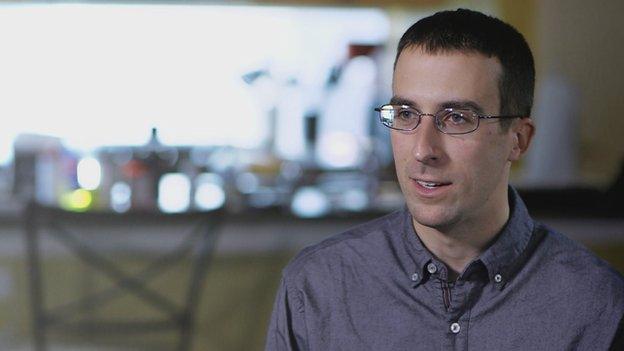
Magness was Salazar's former assistant coach, and the witness for whom Salazar reserved his deepest and most personal criticism.
Salazar said Magness was a "poor coach" who lacked personality and whom the top athletes would refuse to work with.
He also heavily suggested Magness was involved in an inappropriate relationship with an athlete.
"By early May 2012, I told Magness that I would not be renewing his contract for 2013," Salazar said.
However, Magness has provided a number of documents in response.
He produced an email from Salazar dated 7 May 2012 - a month before the official termination of his contract - in which Salazar told a colleague he had "complete confidence" in Magness to look after the team of athletes when on the road without him.
On this occasion, the squad included Salazar's prized athlete, Galen Rupp. Salazar added: "…he'll [Magness] take care of all of them."
On 8 May 2012, Salazar wrote to Magness, approving the idea of him coaching Oregon Project runner Lindsay Allen
"Hi Steve, I just spoke with Lindsay and I think that's a great idea for you to take over her coaching…she needs to train with other top woman runners to fulfil her potential," he wrote.
Magness also says claims about an inappropriate relationship are false.
He said: "I did not have a relationship with any athlete during my time at the Nike Oregon Project.
"I began a relationship with the individual he is referring to in 2013, when both of us, as adults of similar age and with no rules against it, entered a private relationship, long after either of us had been a part of the Oregon Project.
"It's obvious this is being used after the fact to paint me as a bad employee."
Magness said there was no mention of an inappropriate relationship in his exit interview, which he secretly recorded.
He also provided his exit letter from Nike, signed by Stephen Vass, from Nike's legal team.
In the letter, Vass describes the contract termination as "mutual" and writes: "As discussed, both you and Nike have decided to terminate your Nike contract..."
Vass finishes: "Should an opportunity present itself to work together again in the future, Nike would welcome consideration of such opportunity."

Kara Goucher
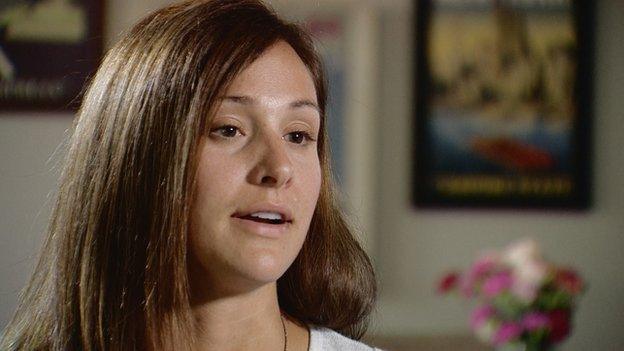
Salazar cited a number of positive comments made about him by Goucher at the point of her departure from the Oregon Project as evidence that her allegations are false, and said her husband Adam was responsible for the breakdown of their relationship.
Goucher initially told the BBC she had been "fearful" about speaking negatively about her former coach.
"I think especially when I first left Alberto, when I was still with Nike, I was afraid to say anything bad," she said.
Adam Goucher said he found it "frustrating" that his wife used to say "we left him [Salazar] as friends and everything was great" when he knew that was not true.
On Thursday, Kara Goucher said: "Alberto's false statements and one-sided, partial stories don't tell the truth.
"Adam and I went to USADA in February 2013 when we had concerns about what we had experienced at the Oregon Project.
"When BBC and ProPublica approached us with the story, we felt that it was time to tell the truth."

Mary Decker Slaney
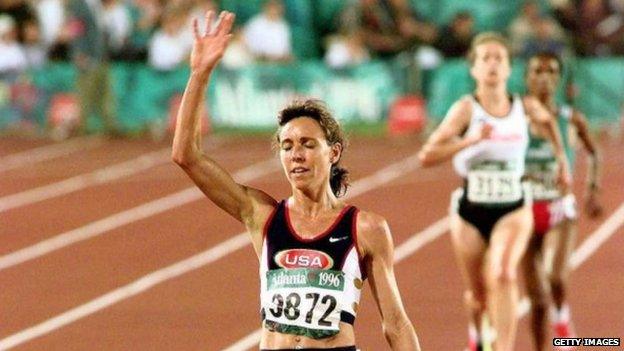
Seven weeks ago, the BBC put to Salazar that he was coach to the US athlete Mary Decker Slaney when she tested positive for testosterone in 1996.
He did not respond to that allegation, but it became a bigger issue when UK Athletics (UKA) was asked what due diligence had been done before Great Britain's Mo Farah was cleared to join the Oregon Project, and also before UKA appointed Salazar as a consultant to its endurance programme in 2013.
In a heated press conference four days after the Panorama broadcast, Farah told the media he had specifically asked Salazar about Slaney before joining him in Oregon, and said Salazar had assured him he was not coaching Slaney at the time of her failed test.
UK Athletics performance director Neil Black said a thorough due diligence process had been completed.
However in the following days, the BBC produced a string of evidence strongly supporting claims that Salazar was indeed a coach of Slaney's when she tested positive.
The evidence included contemporaneous pictures and interviews with the pair training together.
Salazar's 12,000-word response made no mention of Mary Decker Slaney.

What next?
UKA has appointed a commission to investigate whether its and Farah's association with Salazar should continue, and has promised to report by August.
There is no suggestion that Farah himself has been involved in doping.
The BBC understands USADA is also investigating allegations that Salazar skirted anti-doping.
- Attribution
- Published25 June 2015
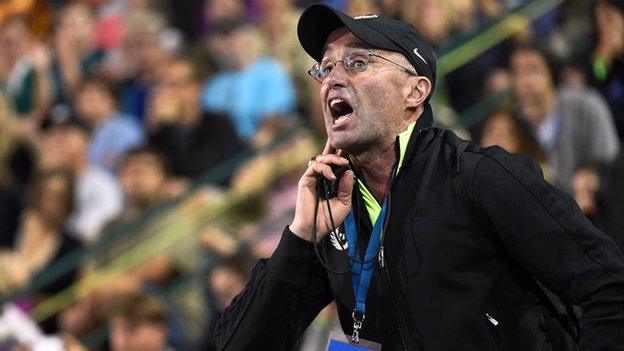
- Attribution
- Published26 June 2015
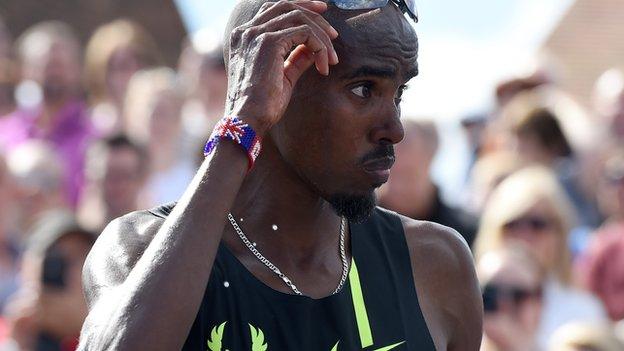
- Published3 June 2015
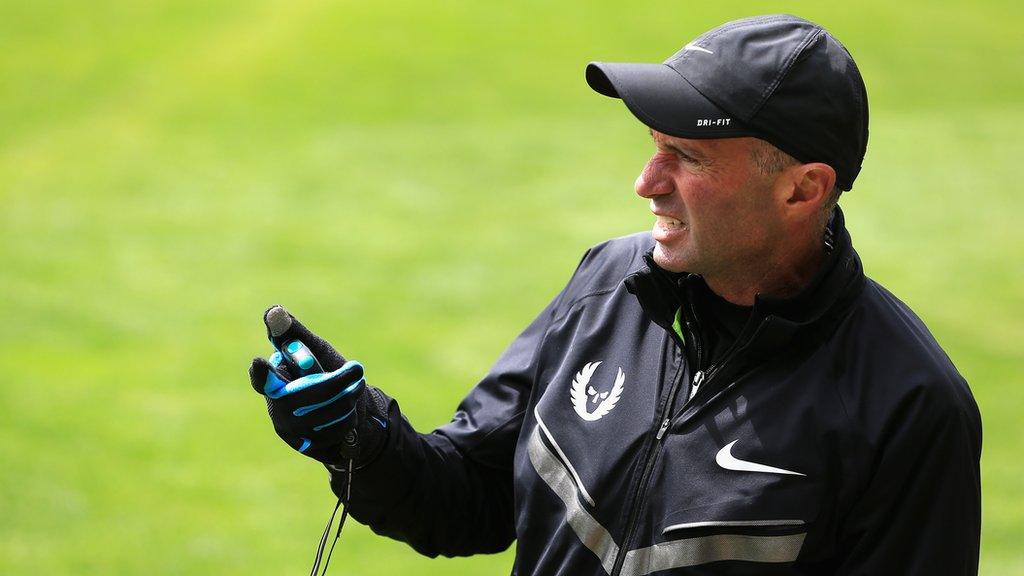
- Attribution
- Published12 June 2015
